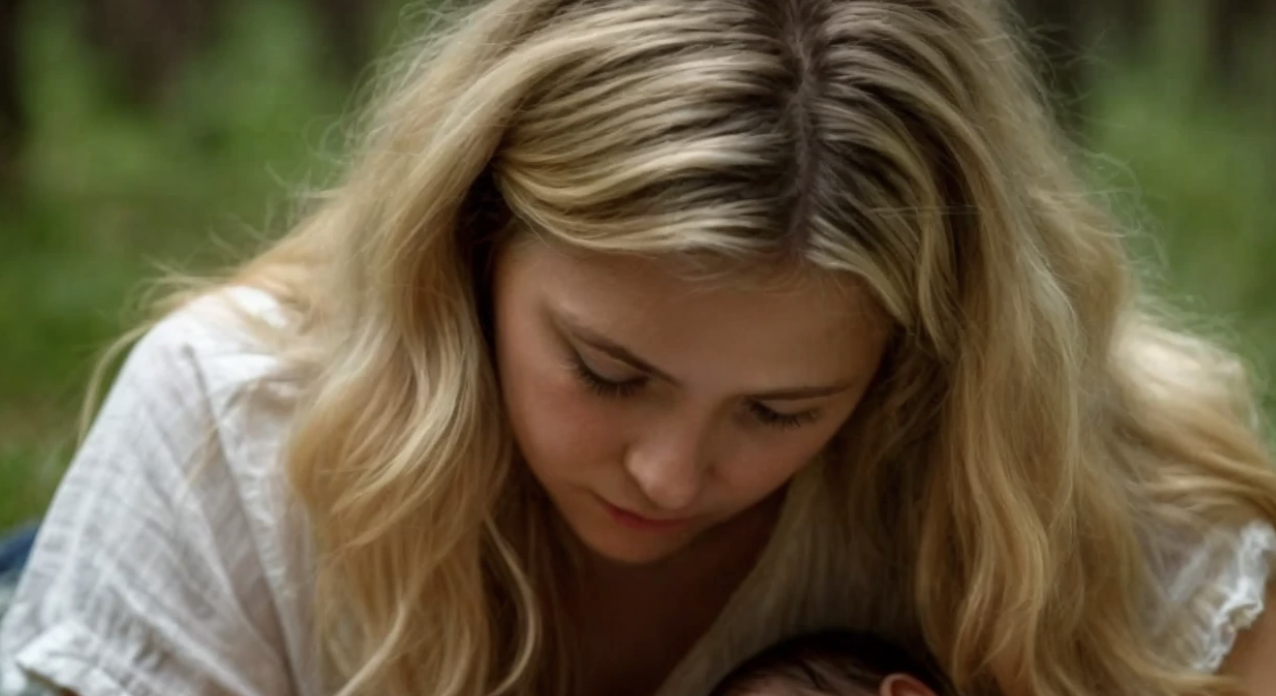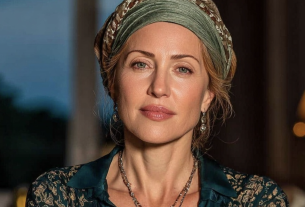The village was almost extinct. Out of the eighteen houses, only two remained inhabited: in one, elderly Varvara lived; in the other — Stepan with Anastasia. They had no children, but they did have Mitrich the goat, three goats, chickens, and a garden, which they tended more out of habit than necessity. Everything they needed was long delivered from the district center by the mail truck.
That day, Anastasia Petrovna went into the forest to gather birch mushrooms. The end of August was generous with mushrooms, as if the forest wanted to thank her for her long years of patience. She carried an old woven basket on her back and quietly hummed a song from her youth. The forest had become her sanctuary, a place of refuge from loneliness and the deep melancholy that had settled inside her many years ago.
At first, she heard a rustling sound. She stopped and listened—and understood: it was crying. No, even two voices.
Anastasia ran toward where the sound was coming from. And there—on a clearing, right by a stump—lay a jacket. In it, there were two infants, pink, crying, naked, with their umbilical cords still attached. A boy and a girl. Very tiny indeed.
She froze. She put down her basket and sank to her knees. Tears started streaming down uncontrollably.
“Oh my Lord…” she whispered, holding the little girl to her chest, “who could have abandoned you, my dear ones…”
She wrapped the children back into the jacket, took them into her arms—heavily, yet gently—and walked back home through the forest, as if she knew the way even in the dark.
Stepan sat silently on the porch with a cigarette when she returned. Seeing the load she carried, he frowned.
“What is that?”
“Children,” replied Anastasia. “I found them in the forest. In a jacket. They’re crying. A boy and a girl.”
He said nothing. He simply got up, opened the door. On the table stood a warm porridge, left from the morning. He cleared it away and set up the goat’s milk to warm.
“Nastya… you do understand that we can’t keep them, right?”
“I understand. But I can’t abandon them.”
She wept. Not out of fear, but because at sixty years old a miracle had suddenly occurred. A terrible, wild, yet real miracle.
A day later, they went to see Gala — at the village council. She understood everything immediately. She took off her glasses, rubbed her nose bridge.
“So you found them… Well. You’re not the first, Nastya, and you won’t be the last. I’ll help. We’ll record them as ‘found,’ process the documents without any fuss. But you do understand — the village is not a city, here even the paramedic comes only once a month.”
Anastasia nodded. She knew. But her heart was breaking.
The little ones grew up in their home. Anastasia got up at night, fed them, and sang them lullabies. Stepan fetched water and changed their diapers, although he used to even wash the goat reluctantly. The children called him “gh-gh” — that was the sound of their first laughter.
When they turned six, a letter arrived from the boarding school. They were summoned to a commission. The children were to be taken away to study.
They packed small bundles. Anastasia put in the bundles the shirts she had sewn, knitted socks, and a few dried apples. On the porch, they embraced. The children wept, clung to them. Makar said:
“Grandma, don’t leave us.”
And Darya:
“We’ll be back soon, won’t we?”
Anastasia couldn’t answer. She only nodded, while tears streamed down her cheeks.
Eighteen years passed.
And one day, on their eighteenth birthday, Makar and Darya learned who they really were.
Everything turned upside down.
Makar barely slept all night. He sat in the hayloft, where he once hid from the storm. Now a storm raged inside him — deep, dragging, relentless.
Darya tossed in the house. Her thoughts were different: she dreamed, hoped, even quietly fantasized that maybe their mother had no other choice, not that she simply did not want to. She still sought excuses.
But Makar — no longer.
In the morning, they went to the district center. In the dusty administrative archive were stored old records — who had come when, who had registered, who had disappeared.
Galina Mikhailovna made a phone call, and the archive was opened for them “on old friendship.”
And there — a document. The year matched.
Full Name: Lilia S. — 18 years old. Arrived temporarily, not registered. Was noticed to be pregnant. Disappeared two weeks after giving birth.
Signature: District policeman Sokolova V.A.
Darya ran her finger along the edge of the sheet.
“Lilia… It’s her. L.S.”
“We’ll find her,” Makar said curtly.
At first, they went to see Varvara Antonovna — the only native of the village. She remembered everyone.
“Lilia? Of course, I remember. Black-haired, proud. She looked as if you owed her something. She said she would leave for the city, become an actress or a singer. Men swarmed around her like bees to honey.”
“Did she live with someone?”
“Alone. In an old bathhouse. And then — she disappeared. No one even noticed when she left.”
Darya found her on social networks.
Neat photos. Bright dresses. Eyebrows like fine threads, lips like a bow. Next to her, a man — dignified, in an expensive suit, with a watch and a severe look. The caption read:
“With my Viktor. Thankful to fate for stability, love, and support.”
Darya trembled all over.
“She… is happy. And they just threw us away like we were nothing.”
Makar silently stared at the screen, frowning. Then he said:
“I’ll go. I need to look her in the eyes.”
He set off alone.
A small café in the city center. Cozy and expensive. It was precisely here that Lilia often posted her “stories” — about breakfasts with her beloved, women’s days, and croissants with cappuccino.
She entered exactly at 10:30. A light scent of perfume, high heels, a stylish handbag. She sat at a table, ordered a coffee. Makar took the seat next to her, watching.
His heart pounded not from fear, but from tension. There she was. His mother. The woman who had given him life. And who had abandoned it.
He rose. Approached her.
“Excuse me, are you Lilia Sergeyevna?”
She looked at him coldly, scrutinizing.
“Yes. And what’s the matter?”
Makar took out a photograph — an old, worn one, where she was wearing that same jacket that once warmed them in the forest.
“Do you recognize this?”
Her hand trembled for a moment. But her voice remained cold.
“No. And who are you?”
“I am one of those you left to die. In the forest. In August.”
Makar spoke calmly, but his eyes were icy.
Lilia paled. She looked out the window.
“This is a misunderstanding. I know nothing. Sorry, I’m in a hurry.”
She got up and left. Her heels clicked, like nails.
Makar remained seated.
He did not expect an embrace.
But he didn’t even hear a simple word of regret.
That evening, Darya asked:
“How is she?”
“Empty. A beautiful shell. A showcase. But inside — emptiness.”
“What are we going to do?”
Makar looked up. Calmly, as if speaking about the weather:
“We will prove it. Through the court. Through the law. Through the truth.”
Let her have everything — money, a house, a husband.
But let the passport at least show that she is a mother. A mother who abandoned.
Viktor Pavlovich lived in a world of numbers, deals, and reliable connections.
He knew how to do things correctly — without scandals, without dirt. Always impeccably dressed, always polite. But behind his politeness hid a concrete wall.
He hadn’t noticed for long how Lilia was manipulating them. Or perhaps he was just pretending. She was convenient — beautiful, well-groomed, and never asked questions. And he provided, spoiled, bought.
When a young man entered his office and calmly said:
“I am your… stepson,” he first thought it was a joke.
But Makar was not one to joke.
He placed a folder on the table:
A DNA test, an extract from the archive, a statement of recognition of kinship.
And a letter from a notary.
“You are married to a woman who abandoned her children in the forest. We want nothing but the truth.”
“What are you going to do?” Viktor asked coldly.
“Do what must be done. Speak openly. Through the court, if necessary. And if you really are an honorable man, you will want to know who you spent half your life with.”
That evening at home, Viktor approached Lilia. She was just making a mask and watching a series.
“Lilia. We need to talk.”
“Not now, Vit’. I’m tired.”
“Now,” he said firmly.
He took out the photograph — the very one of her with the children in the jacket.
Lilia shuddered but quickly composed herself.
“This is a fake. I’m being set up.”
“Are you familiar with the concept of ‘leaving someone in danger’?”
“Viktor, you don’t understand! I was 18! I had no choice! I was scared! I just… wanted to start a new life!”
“Without children?”
“Yes! Without poverty, without filth, without judgment! I gave birth — and realized I couldn’t cope! That they… were dragging me down!”
He was silent for a long time.
“Did you never think that they might have their own life?”
“And what now? Do you want to adopt them?”
“No. But I won’t live with a woman who abandoned her children and lied to me for twenty years.”
A week later, Viktor Pavlovich came to the village himself.
Without a tie, without guards. He brought a basket of fruits and documents.
“Darya. Makar. I’m not a saint. And I’m not your father. But I’m a man. And if my signature can compensate even a little for what you experienced — it will be mine.”
He handed over the papers:
“Half the house. Officially. As a gift deed. Without conditions.”
“We are not asking for charity,” Makar replied reservedly.
“I know. That’s why this isn’t charity. It’s a gesture. Toward your conscience.”
He sat on a bench next to Stepan, lit a cigarette. They sat in silence for about five minutes. Then he said:
“You probably have very good children.”
“Not probably,” replied Stepan. “Absolutely.”
Lilia tried to resist. She wrote, called, threatened.
But the court didn’t care.
The evidence was convincing. Makar’s lawyer spoke clearly, without emotions, relying solely on facts. Darya couldn’t be present — she was crying. Anastasia held her hand in the waiting room.
At the hearing, Lilia said for the first time:
“I am sorry.”
But it sounded as if she was sorry not for the children, but for being exposed.
The court’s decision stated:
Recognize Lilia as the biological mother. Require the corresponding changes to be made in the documents. Confirm the fact of leaving minors in danger. Impose a suspended sentence and a fine. The media did not write about this case. But those who needed to know, did.
And in the evening, in a house under an old linden tree, Darya sat on the porch and quietly said:
“I still cannot understand how one can just leave. Just… throw away.”
Anastasia embraced her.
“You won’t understand. Because you are not like that.”
Chapter 5. The Home
A month had passed since the trial.
Lilia left. She said she couldn’t stand the “condemning looks.”
But in essence, she had simply fled. She disappeared from Viktor’s life just as she once disappeared from the lives of her children.
No letters, no calls, no apologies. Only silence.
And did she matter to anyone now?
Viktor, on the contrary, stayed.
He didn’t try to become a father to Makar and Darya — he didn’t intrude into their souls, nor impose himself. He was simply there. And that was enough.
The gift deed for the house was processed quickly. A large brick cottage on the outskirts of the city, with a garden and a spacious kitchen, now officially belonged to the twins.
The very first thing Darya suggested was:
“We need to bring the grandparents.”
“And make them a room with a separate entrance,” added Makar. “So that it’s warm and comfortable.”
Anastasia couldn’t hold back her tears.
Stepan simply put his hand on his son’s shoulder — not formally, but genuinely.
Two weeks later the whole family gathered at the threshold of the new home. On a cart were suitcases, jars of raspberry jam, a bag of potatoes, a bundle with icons, and embroidered napkins by Anastasia.
Darya showed them around:
“Here will be the kitchen-living room. This is your little corner, grandma. And here grandpa can tinker — even build a boat if he wishes.”
Stepan inspected the workshop and, for the first time in a long time, smiled widely.
“Maybe we can set up some beehives too…”
And Anastasia, holding Darya, whispered:
“You earned all this, my girl. Not out of revenge — but because of the truth. And the truth always prevails.”
Makar decided to continue his studies — to become a lawyer. He wanted to help other children, just like he had been “found.”
Darya got a job at the library. She led a club for teenagers. She wrote poems. Sometimes they were published in the district newspaper under the pseudonym: Darya Lesnaya.
Viktor visited on weekends. He brought saplings, honey, books. He wasn’t trying to atone for his guilt — he simply invested in his new family, gradually, step by step.
In the fall, when the first snow settled on the roof, Darya hung a large photograph in the living room.
In it were she with Makar, Anastasia with a warm smile, and Stepan with his rare but sincere laughter. In the background — apple trees. On the right — the old jacket, as a symbol of memory.
Below the photograph hung a wooden sign:
“Family isn’t about blood. It’s about choice. And we chose each other.”
And in the evening, over tea with pie, Anastasia suddenly said:
“You know, you saved me back then. It wasn’t that I found you — you found me.”
“No, grandma,” replied Darya, drawing close to her. “We found each other.”
“And also,” added Makar, “now you are not just a grandmother. Now you are simply a mother.”
Outside, the snow fell softly, as if covering all the past with a warm blanket.
And inside the house there was the aroma of pies, milk, and happiness.
A real, well-deserved happiness.



